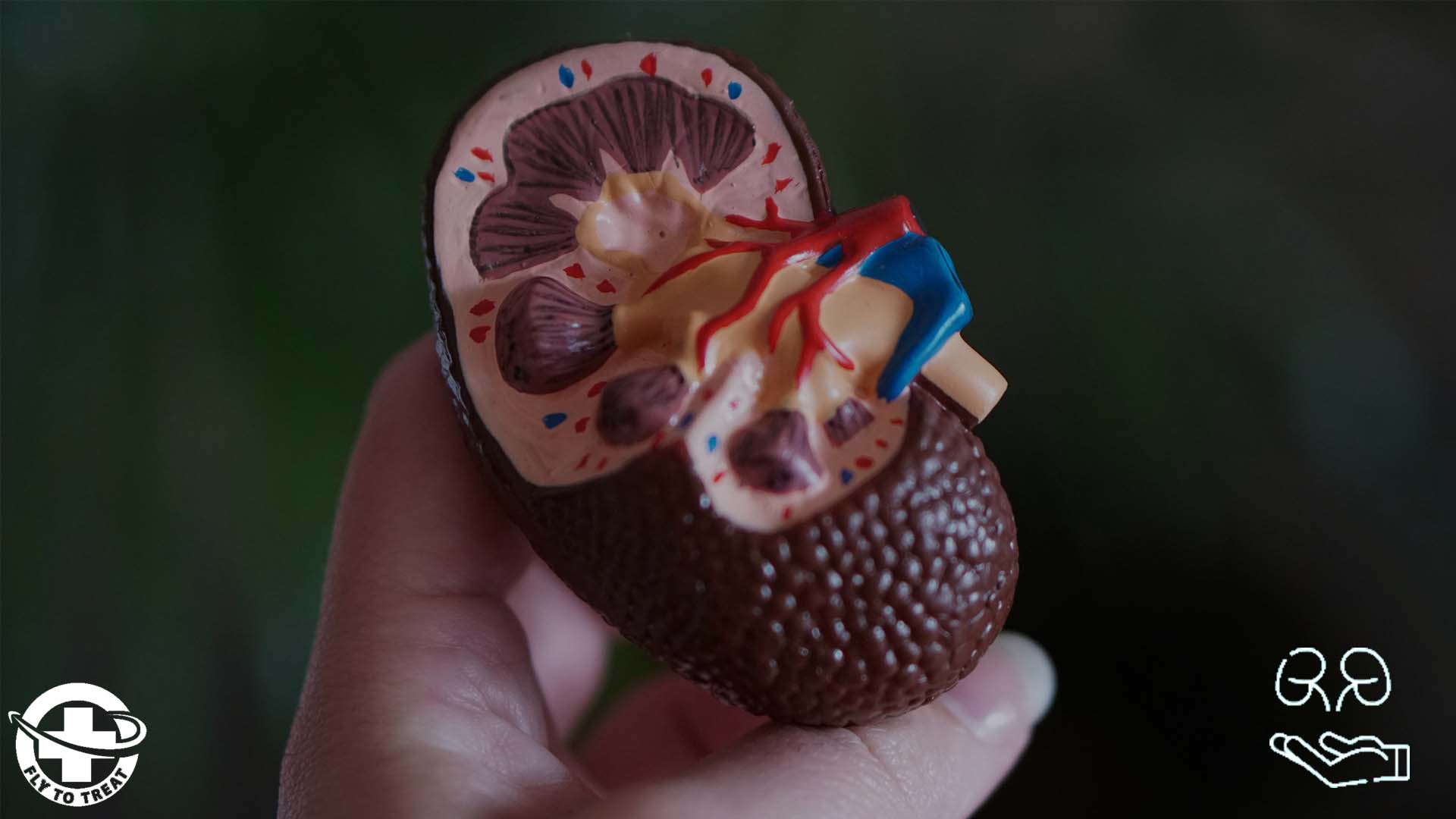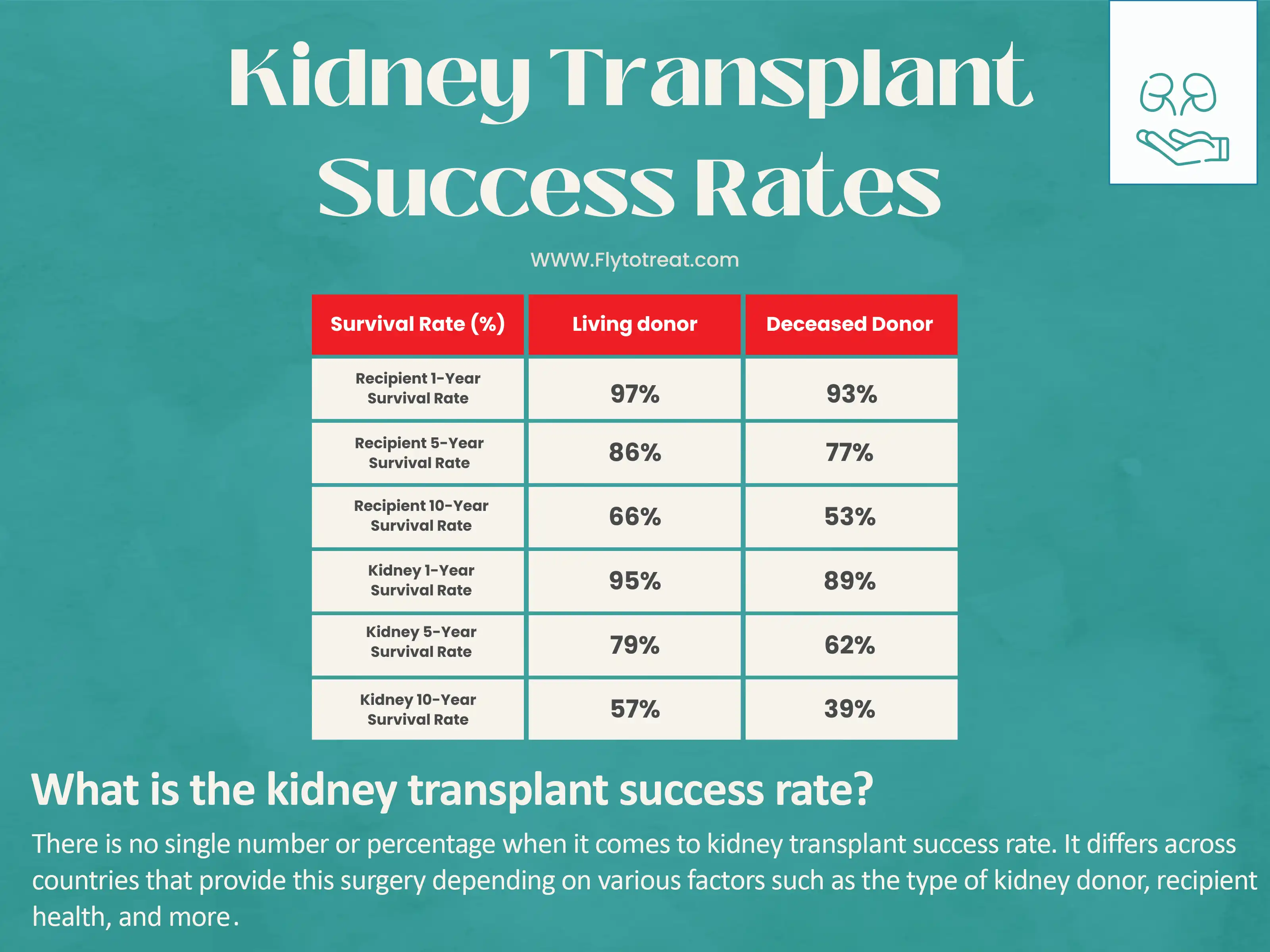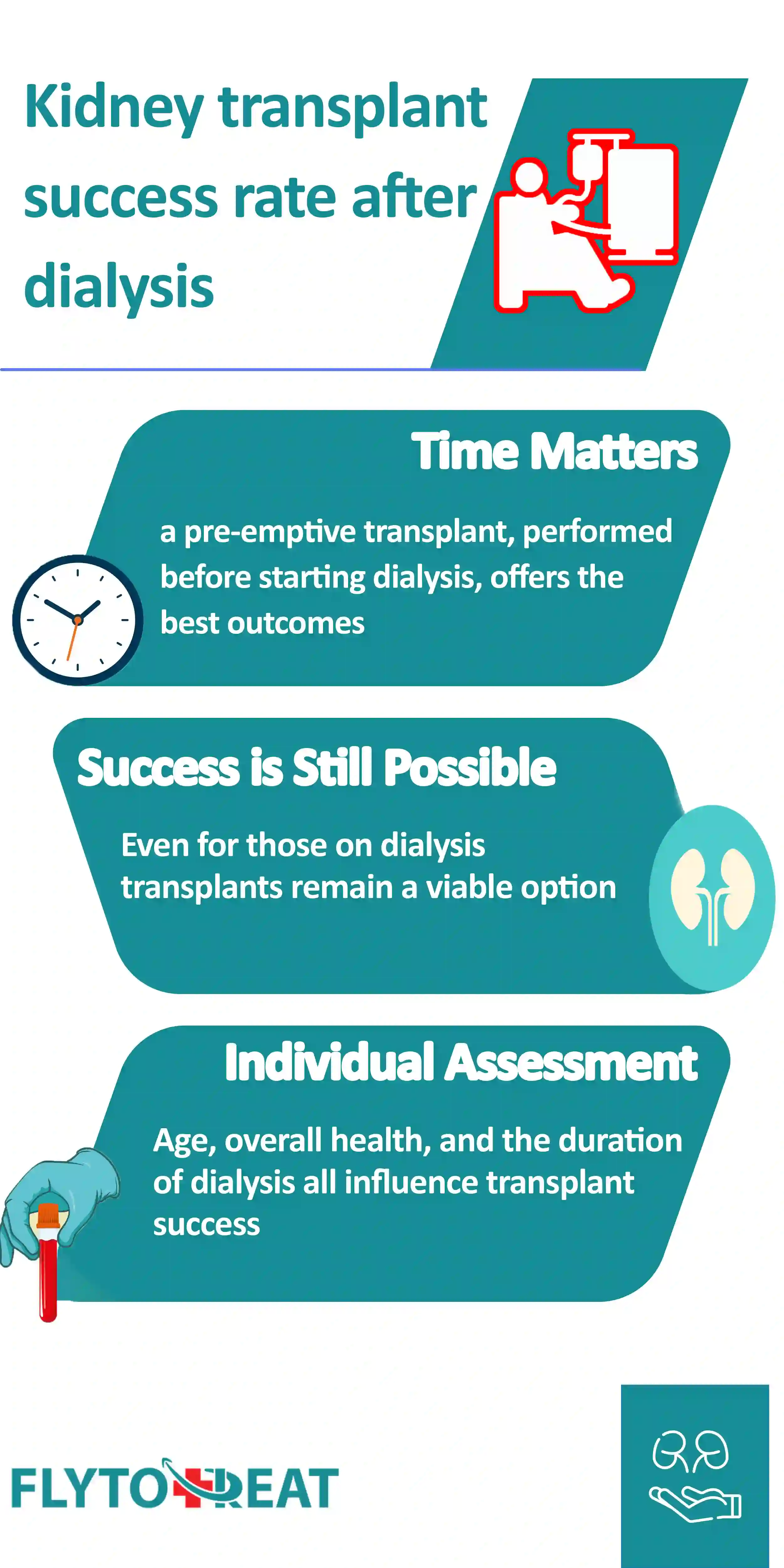
What is important about kidney transplant success rate?
The renal transplant success rate is a critical factor for patients considering a kidney transplant. With support from FlyToTreat, this article aims to provide straightforward insights into how kidney transplant success rates vary by age, country, type of transplanted kidney (living or deceased donor), and other factors, offering hope and clarity for those navigating their treatment options. We will also answer some most important questions like life span of transplanted kidneys and the difference between dialysis and kidney transplants.
Kidney transplant success rate by age
The success of a kidney transplant, measured by renal transplant success rate, can vary depending on your age. Here's a breakdown:
• Generally High Rates: Success rates for kidney transplants are usually high, with many patients enjoying a well-functioning kidney for many years.
• Age Matters: Studies suggest younger recipients (typically under 65) have slightly better long-term graft survival rates than older patients.
• Individual Factors: Other factors, such as overall health, the condition of the donor's kidney, and anti-rejection medication, play a significant role in transplant success.
While age is a consideration, it shouldn't solely determine your candidacy for a transplant. Consult a doctor in FlyToTreats team to understand your circumstances and the likelihood of a successful kidney transplant

Kidney transplant success rate 20 years
The good news?
Kidney transplants offer impressive long-term results. Studies show that kidney transplant survival rates can be quite high at the 20-year mark, with some exceeding 50% for organs from living donors. These results highlight the potential for a significantly improved quality of life for transplant recipients.
What is the best age for kidney transplant?
Studies found that kidney transplant survival rates were similar between younger and older patients. Still, elderly patients had a higher risk of complications and death after surgery. This suggests that careful selection of elderly candidates for transplant is important.
Ultimately, the best age for a kidney transplant will depend on your health condition. It would be best if you talked to your doctor about your specific situation.
Can a 90 years old have a kidney transplant?
Age alone shouldn't necessarily be a barrier to a kidney transplant. Studies show successful transplants in patients as old as 90. However, a thorough evaluation is crucial. Doctors consider overall health, not just age, to determine if a transplant offers the best chance for a good quality of life with minimal risks.
Kidney transplant success rate by country
How many kidney transplants are successful worldwide? The success of a kidney transplant, measured by renal transplant success rate, can vary to some extent depending on the country where the surgery is performed, and the best country for kidney transplants has a low failure rate. Here's what the research suggests:
• Variations Exist: Studies report disparities in renal transplant success rates between countries. Factors like access to anti-rejection medication, healthcare resources, and overall transplant volume can influence outcomes.
• Focus on Quality: The trend is to ensure high-quality care throughout the transplant process, regardless of location.
• Individualized Assessment: Your doctor will consider various factors beyond location to determine your suitability for a transplant and the potential for long-term success.
While country-specific variations might exist, advancements in transplant medicine aim to achieve consistent success rates globally. A doctor can assess your circumstances and provide insights into transplant success rates at your specific treatment center.
The renal Transplant Success Rate in India
India has become a leading destination for kidney transplants, boasting high success rates. Sources report a kidney transplant success rate in India exceeding 90% for transplants using kidneys from living donors. This promising statistic makes kidney transplantation a viable option for many patients seeking renewed kidney function.
The renal transplant success rate in Pakistan
Pakistan offers promising possibilities for kidney transplants. The Sindh Institute of Urology and Transplantation (SIUT) reports a renal transplant success rate exceeding 95%. Similarly, the Rehman Medical Institute highlights their achievement of a remarkable 96% success rate for healthy recoveries following transplants. These figures suggest Pakistan has become a center for successful kidney transplantation.
The renal transplant success rate in Canada
Canada boasts impressive kidney transplant success rates. According to the Canadian Institute for Health Information (CIHI), deceased donor kidneys have a renal transplant success rate exceeding 77% after five years. Living donor transplants show even better results, with a survival rate surpassing 88% at the five-year mark. These statistics highlight Canada's strong healthcare system and expertise in kidney transplantation.
The renal transplant success rate in Iran
Iran has a long history of successful kidney transplants. Studies report showes kidney transplant in iran survival rates exceeding 90%, with promising long-term outcomes. This achievement is attributed to the development of a well-established transplant program and a high prevalence of living kidney donation.
The renal transplant success rate in the UK
The UK demonstrates encouraging kidney transplant success rates. The NHS Blood and Transplant (NHSBT) reports that 9 out of 10 patients are alive after one year with a kidney from a living donor, with a survival rate of 72-76% for deceased donor kidneys after ten years. These figures solidify kidney transplantation as a viable treatment option in the UK.
The renal transplant success rate in the USA
The USA boasts impressive kidney transplant outcomes. Studies report kidney transplant success rates (renal transplant survival rate) exceeding 90% in one year, offering renewed hope for many patients. This statistic highlights kidney transplantation as a life-changing treatment option in the United States.
The renal transplant success rate in the Philippines
The Philippines offers promising results for kidney transplants. The National Kidney and Transplant Institute (NKTI) reports a high kidney transplant success rate exceeding 90% for living donor transplants. Studies also suggest positive outcomes for deceased donor transplants. This makes kidney transplantation a viable option for many patients in the Philippines.
The renal transplant success rate in Australia
Australia shines with impressive kidney transplant results. According to DonateLife, 90% of kidney transplant recipients from living donors are still alive after one year. Studies report similarly positive outcomes for deceased donor transplants, exceeding 85% survival rate at one year. These statistics solidify kidney transplantation as a leading treatment option in Australia.
The renal transplant success rate in Singapore
Singapore boasts excellent kidney transplant outcomes. Hospitals report kidney transplant success rates exceeding 90% after one year for living donor transplants. This promising statistic highlights kidney transplantation as a viable and effective treatment option for many patients in Singapore.
Kidney transplant survival statistics
Kidney transplants offer a lifeline for many patients with chronic kidney disease. The good news is that kidney transplant survival rates are generally high. Here's a breakdown:
• Impressive Outcomes: Statistics from organizations like UNOS (United Network for Organ Sharing) show that over 90% of transplanted kidneys from living donors still function after one year. This success rate remains impressive several years post-transplant, with many patients enjoying long-term benefits.
• Individual Considerations: It's important to remember that individual results can vary. Factors like age, overall health, and the condition of the donor's kidney can influence success rates.
• Doctor's Guidance: Consulting a doctor allows for a personalized assessment of your specific situation and the potential success of a kidney transplant. They can discuss your health history, risk factors, and the likelihood of a favorable outcome.
Second kidney transplant success rate
Studies report that second kidney transplants offer a similar renal transplant survival rate as first transplants, often exceeding 75% in one year. However, these rates can vary depending on factors like the cause of the first transplant failure and the type of donor (living or deceased) in the second surgery.

How successful are kidney transplants
Several factors influence the success of a kidney transplant, impacting the renal transplant success rate. Here's a glimpse:
• Recipient Health: A patient's overall health plays a key role. Well-managed conditions like diabetes and high blood pressure can improve transplant outcomes.
• Donor Match: Compatibility between recipient and donor is crucial. Factors like blood type and tissue matching influence the body's acceptance of the new kidney.
• Age: Age is a consideration but shouldn't be the sole factor. Younger recipients may have a slight edge in long-term survival rates. Still, successful transplants are possible for patients of various ages.
• Anti-Rejection Medication: Managing the body's immune response is critical. Medications help prevent rejection, a significant risk factor for transplant failure.
• Surgical Expertise: The skill and experience of the transplant team can significantly impact the success of the surgery and overall outcome.
Remember:
A thorough medical evaluation considers these factors to determine each individual's likelihood of a successful transplant. For more exploration, see FlyToTreats' article about kidney transplant requirements.
When was the first successful kidney transplant?
The history of kidney transplantation marks a significant milestone in modern medicine. The 1st successful kidney transplant between living patients occurred in 1954. This groundbreaking surgery was performed by Dr. Joseph Murray in Boston on identical twins, eliminating potential rejection issues due to their perfect genetic match. This success paved the way for further advancements in transplant medicine, leading to the life-saving procedures available today.
Can I live 50 years after a kidney transplant?
Living 50 years after a kidney transplant is certainly possible! While the average lifespan of a transplanted kidney varies, inspiring stories showcase the potential for long-term success. News reports highlight cases of patients enjoying well over 40 years with a functioning transplanted kidney. These examples offer a beacon of hope, demonstrating that kidney transplants can significantly improve the quality of life for many individuals.
It's important to remember that various factors influence renal transplant success rates, such as overall health, Anti-Rejection Medication, Donor Match, and lifestyle choices. Consulting a doctor on the FlyToTreat team allows for a personalized assessment of your specific situation and the potential for a long and healthy life after a kidney transplant.
Cadaver kidney transplant success rate
Cadaver kidney transplants, using organs from deceased donors, offer a chance at renewed kidney function for many patients. Here's a glimpse at the success rates:
• Promising Statistics: Studies report a cadaver renal transplant survival rate exceeding 90% in one year. This means over 90% of transplanted cadaver kidneys still function after the initial year.
• Long-Term Potential: While the average lifespan of a transplanted kidney varies, some cadaver kidneys can function for many years. Careful patient selection and meticulous surgical techniques contribute to positive long-term outcomes.
• Compared to Living Donors: Success rates tend to be slightly lower than transplants from living donors due to factors like the condition of the deceased donor's kidney. However, cadaver transplants remain a life-saving option, especially considering the ongoing shortage of living donors.
Kidney transplant success rate after dialysis
Are kidney transplants successful after dialysis? Dialysis is a life-saving treatment, but a kidney transplant offers renewed freedom and an improved quality of life. Here's how dialysis time impacts transplant success rates:
• Time Matters: Studies suggest that a pre-emptive transplant, performed before starting dialysis, offers the best outcomes. Kidney transplant survival rates are generally higher for patients who haven't been on dialysis for long periods.
• Success is Still Possible: Even for those on dialysis, transplants remain a viable option. Statistics show good survival rates for kidneys transplanted into patients on dialysis for a reasonable amount of time.
• Individual Assessment: Age, overall health, and the duration of dialysis all influence transplant success. A doctor can evaluate your specific situation and determine the potential benefits of a transplant after dialysis.

Does a kidney transplant shorten your life?
A kidney transplant can significantly improve and even extend a patient's life:
• Increased Life Expectancy: Kidney transplants significantly boost life expectancy compared to dialysis. Studies show patients with transplants can live considerably longer than those who remain on dialysis.
• Improved Quality of Life: Transplants allow for greater freedom and a more active lifestyle than dialysis. This can lead to better overall well-being and health.
• Long-Term Potential: With proper care and medication adherence, transplanted kidneys can function for many years. Some patients enjoy decades of improved health after a successful transplant.
Remember: Kidney transplants are major surgeries with potential risks. However, for many patients with chronic kidney disease, they offer a chance at a longer and healthier life.
Conclusion
Understanding the renal transplant success rate is essential for anyone considering a kidney transplant. FlyToTreat offers guidance and support through this process, helping patients make informed decisions based on age, health, and location factors. This document underscores the high success rates achievable, particularly with the advancements in medical care and surgical techniques worldwide, promising a significantly improved quality of life for many.
MEDICALLY REVIEWED BY: Dr. Ali Bazazi
AUTHOR: FlytoTreat's team of Authors
30 March 2024 - Updated At: 01 February 2025
Related Articles
Comment





